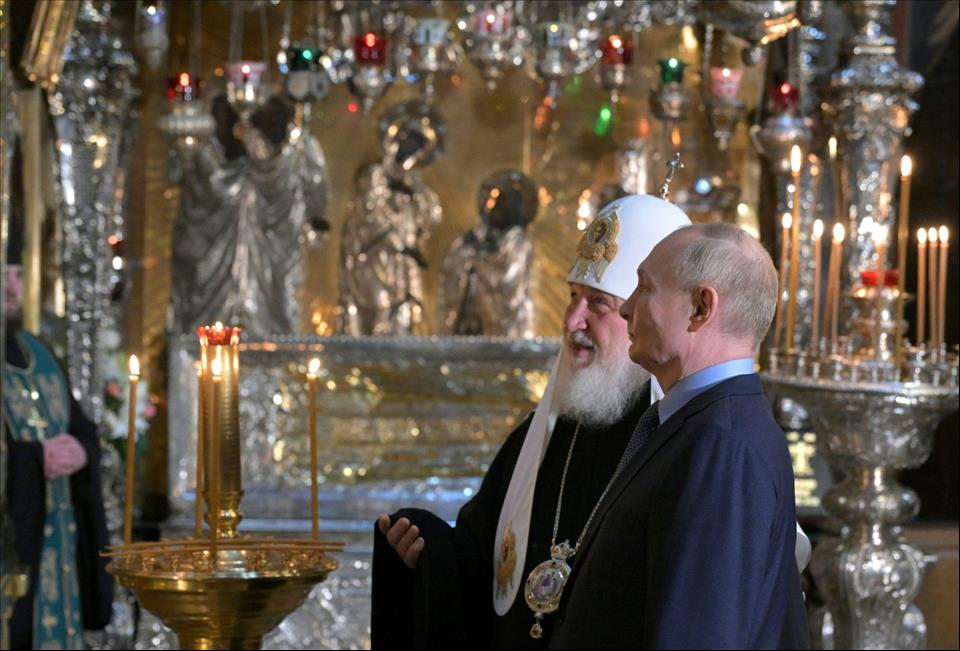
Ukraine War: Religious Leaders Are Playing An Important (And Unusual) Role
These are just a few examples of the ways that religious leaders are responding to the war in Ukraine. Throughout history it has been common for nations at war to claim that God is on their side. The extent and scale of active participation by some religious leaders in this conflict, however, is exceptional.
Political leaders in both Russia and Ukraine have looked to their religious communities for support. In some cases, religious leaders have offered explicit support and even donned uniforms to serve in the armed forces, providing important sources of legitimacy for their countries' position on the war. In other cases, religious leaders have fled under the pressure to take sides.
Patriarch Kirill, the head of the Russian Orthodox Church, has enjoyed the highest public profile of any of the leaders of the major faiths in Russia or Ukraine during the war. Rumoured to have long-standing ties to the Russian security services, Kirill has been an important bastion of support for Russian president Vladimir Putin's campaign to defend“traditional family values” . Putin has argued that Russian traditional values will be diluted or even replaced by the more“decadent” attitudes prevalent in the west, such as tolerance for LGBTQ+ rights, including gay marriage.
In addition to leading a church that blesses Russia's soldiers and weapons on their way to war, Kirill also performs a vital service to the Kremlin by echoing Putin's efforts to use key moments in history to justify the invasion of Ukraine. These include citing the adoption of Christianity by Prince Volodymyr of Kyiv in 988 as the moment when Russia was founded, and the source of Moscow's claim to Ukraine.
Kirill is also engaged in a struggle to reassert control over a network of Orthodox churches that stretches over the former Soviet Union and beyond – holding sway over Orthodox diaspora communities around the world. Church law places them all under the leadership of the Moscow Patriarchate. This position is actively resisted in several countries, including Ukraine, where the Orthodox church broke away from Russian control after the annexation of Crimea.
Orthodox believers pray near the debris of their chapel in downtown Kyiv. Ukrainian authorities dismantled the chapel, which was aligned with the Russian Orthodox church. SERGEY DOLZHENKO /EPA
Concern about religion being used for political purposes has become apparent since the start of the Russian invasion. Fearing a fifth column of Russian sympathisers, the Ukrainian government has taken steps to seize control of churches that have continued to adhere to Moscow in religious matters. Meanwhile, in territories occupied by Russian forces, Ukrainian Orthodox churches have been destroyed and congregations and their priests subjected to reprisals.
Other faith leadersBut while Orthodoxy is the dominant religion in both Russia and Ukraine, the religious leaders of other faith communities have also taken clear positions on the war. Ukraine's Chief Rabbi, Moshe Reuven Azman, combines his humanitarian work for Jews who have been displaced by the war with public statements refuting Russia's claims that Ukraine is governed by Nazis. For Azman, opposing the war means not only looking after the material needs of fellow Jews but also resisting Moscow's efforts to use the memory of the second world war and the Holocaust for its own purposes.
Although Muslims are believed to make up only about 4% of the just under 40 million population , they and their leaders actively support Ukraine's war effort. For many, fighting against Russia's invasion is not only a matter of Ukrainian patriotism but also a way of seeking justice for the harsh treatment that they and their ancestors have suffered at the hands of Moscow.
Most Ukrainian Muslims are Crimean Tatars, who were forcibly deported by Stalin in retaliation for imagined disloyalty during the second world war. Although some eventually managed to return to Crimea, in 2014 many Tatars fled Russian control of the peninsula, while those that have remained face intimidation, arrest and casual brutality. Moscow actively encourages Russians to settle in Crimea. Between 2014 and 2018, according to official Russian figures, some 247,000 Russians had moved to Crimea . This is part of Putin's policy to lend legitimacy to the claim that Crimea is authentically a Russian territory and to create a politically loyal population there.
But while Ismagilov, mufti of the Religious Administration of Muslims of Ukraine, serves as a medic in the Ukrainian military wearing combat fatigues, Russia's chief mufti Talgat Tadzhuddin has called upon Muslims to take Russia's side in the war, describing it as a holy jihad.
To complicate matters further, there are Muslims who are Chechen nationals fighting on both side of this war. Soldiers loyal to Chechen president Ramzan Kadyrov fight for Russia. Opposing them are Chechens who fight in separate units affiliated with the Ukrainian armed forces. These men hope to help deliver a serious blow to Russia and gain valuable skills and experience for a future armed effort to achieve independence.
The motives of religious leaders and their communities reflects this conflict's complexity. For Patriarch Kirill the war is an opportunity to consolidate sacred and secular power. The chief rabbis of both Ukraine and Russia clearly see it as a test of character and a matter of principle. For Crimean Tatars and the Chechens fighting for Ukraine, it is a chance to regain a lost homeland. Like so many other aspects of this war, the convergence of religion and politics defy simple explanations.

Legal Disclaimer:
MENAFN provides the
information “as is” without warranty of any kind. We do not accept
any responsibility or liability for the accuracy, content, images,
videos, licenses, completeness, legality, or reliability of the information
contained in this article. If you have any complaints or copyright
issues related to this article, kindly contact the provider above.
















Comments
No comment